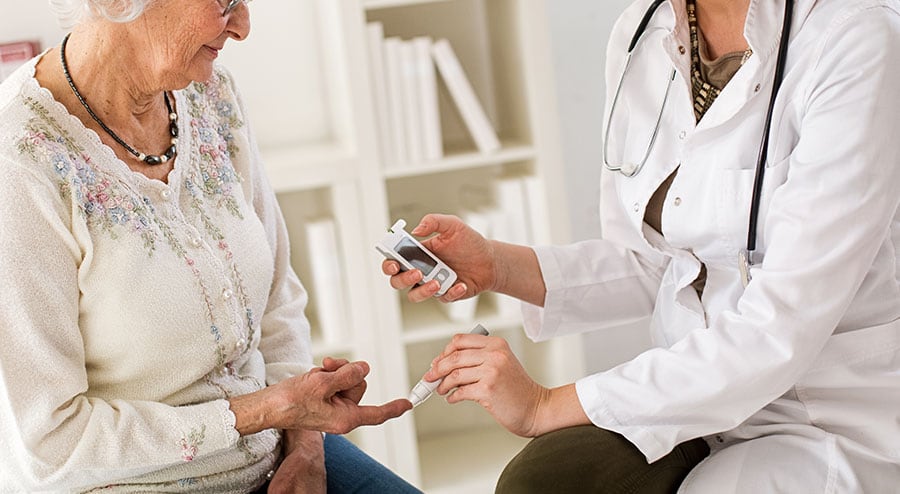The elderly or older person gets diabetes when their blood glucose, also called blood sugar becomes too high. Type 2 diabetes is the most common form to develop as we get older.
Blood sugar levels fluctuate constantly during the day, so it is important that you do regular blood glucose testing, and monitor what you eat and drink to get a better understanding of how best to manage the condition. This can help prevent you from developing other diabetes-related health problems.
So, what is the normal blood sugar level for an 80 year old.
What is the normal blood sugar level for an 80-year-old ?
Answer snippet:
| OTHER C0-MORBIDITIES / HEALTH CONDITIONS | COGNITIVE IMPAIRMENT | TARGET
HAEMOGLOBIN A1c (HbA1C) | FASTING TARGET | BEDTIME TARGET |
|---|---|---|---|---|
| None or few chronic health conditions | None or mild | 7.5% or less | 90–130 mg/dL | 90–150 mg/dL |
| Multiple chronic conditions | Mild to moderate | 8% or less | 90–150 mg/dL | 100–180 mg/dL |
| Late-stage illness
(people living in a 24 hr care residential / nursing home) | Moderate to severe | 8%-9% | 100–180 mg/dL | 110–200 mg/dL |
What are blood sugar levels?
The correct terminology for blood sugar levels is glycaemia, but is also known as blood sugar concentration or blood glucose level. Glycaemia is the concentration of glucose at any one time that a person has in their bloodstream.
Glucose is a type of sugar used by the body to provide energy and circulates in your bloodstream.
The hormone in your body, insulin produced in the pancreas regulates your blood sugar levels by releasing into the bloodstream to maintain normal levels.
Keeping your blood sugar levels within a safe range will ensure that it reduces the risk of diabetes or other illnesses, such as heart disease or stroke.
Comparison table of blood glucose levels with HbA1c readings
| HbA1c (%) | HbA1c (mmol/mol) | Ave. Blood Glucose (mmol/L) |
|---|---|---|
| 13 | 119 | 18 mmol/L |
| 12 | 108 | 17 mmol/L |
| 11 | 97 | 15 mmol/L |
| 10 | 86 | 13 mmol/L |
| 9 | 75 | 12 mmol/L |
| 8 | 64 | 10 mmol/L |
| 7 | 53 | 8 mmol/L |
| 6 | 42 | 7 mmol/L |
| 5 | 31 | 5 mmol/L |
Normal blood sugar levels for the elderly and seniors (over 65)
Normal blood sugar levels for the elderly and seniors over the age of 65 are different from those of younger adults.
As we age muscle loss, disability, and frailty are more prevalent in men and women with diabetes and may be related to the presence of hyperglycemia or insulin resistance.
For those elderly and seniors who struggle to maintain healthy blood sugar levels should monitor what they eat and drink, their daily routines and do regular checks.
How is it best to monitor your blood sugar levels
You can use a device called a continuous glucose monitor (CGM) if you treat your diabetes with insulin. Or you can test your blood sugar at home with a portable electronic device called a blood sugar meter using a small drop of your blood.
A continuous glucose meter (CGM) is one way to check your blood sugar and you should already have one if you treat your diabetes with insulin.
Alternatively, you can test your blood sugar at home with the finger test prick method by using a portable electronic device ( the kit should have a needle (lancet) to prick your finger to extract blood, a digital display and somewhere you can insert a test strip.
The device should register a reading after a few seconds.
Tips on managing your blood sugar levels
If you are manually logging readings –
- Record date of reading
- Time
- Result of test
- Medication and dose
- Dietary information
- Exercise information
If recording electronically –
- Many devices will allow you to download directly onto your phone or computer
Regular readings taken will show you what, if any, there is to pattern of results.
If you don’t get frequent results that fall within your target range goals, then contact your general practitioner (GP), or other suitable health care provider to discuss further.
Conclusion
Hopefully, this should give you information about what should be the normal blood sugar level for an 80-year-old man or woman.
However, if you need any further help or advice please contact me at mark@elderlyfallsprevention.com and I will be happy to help.

